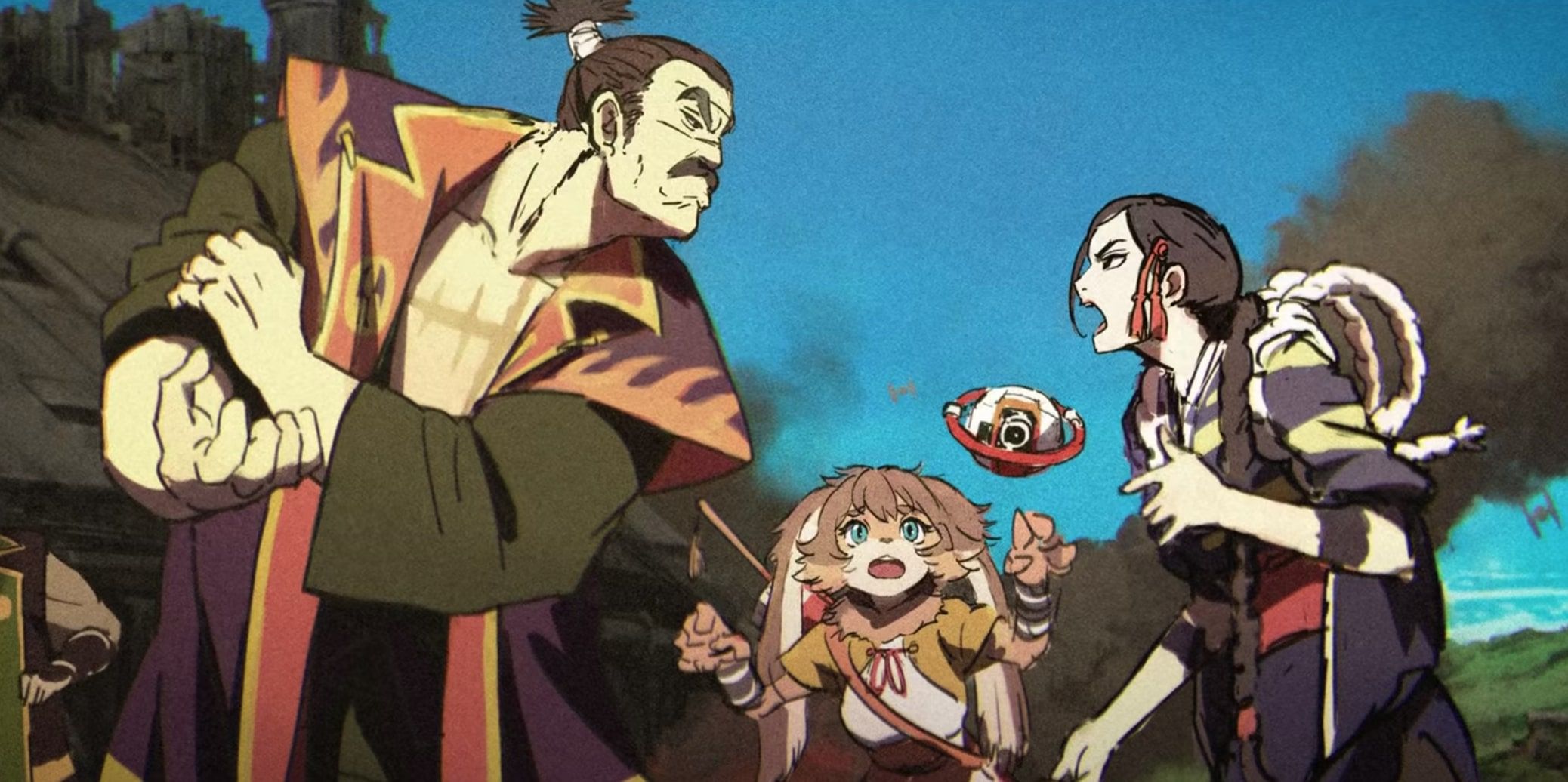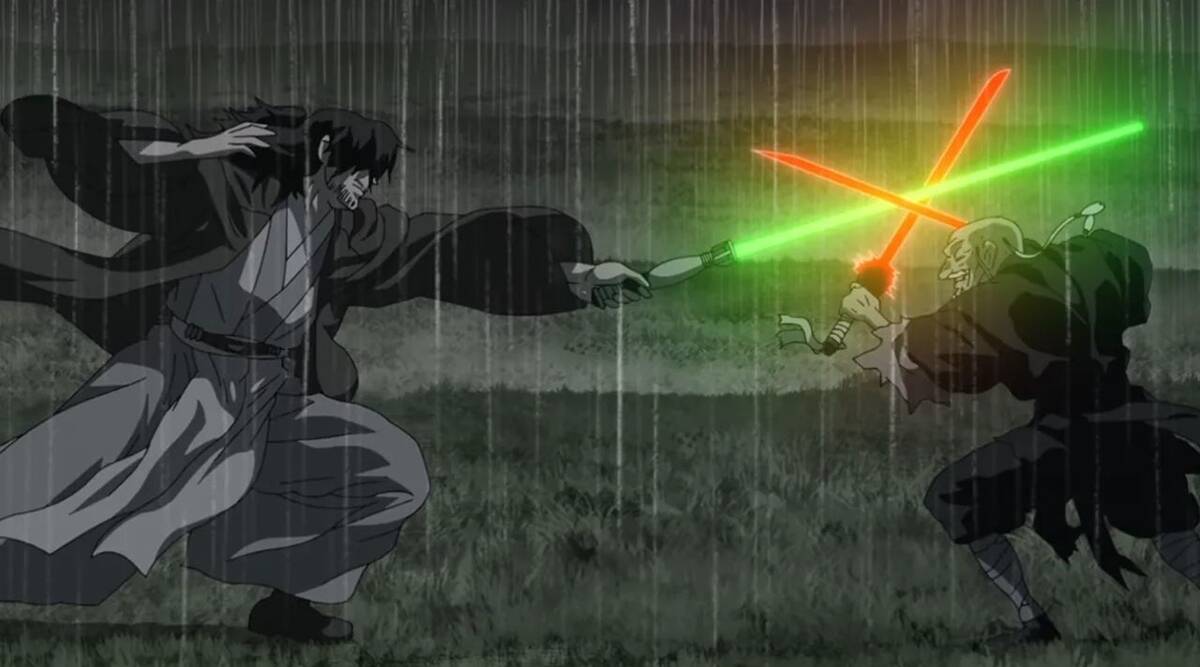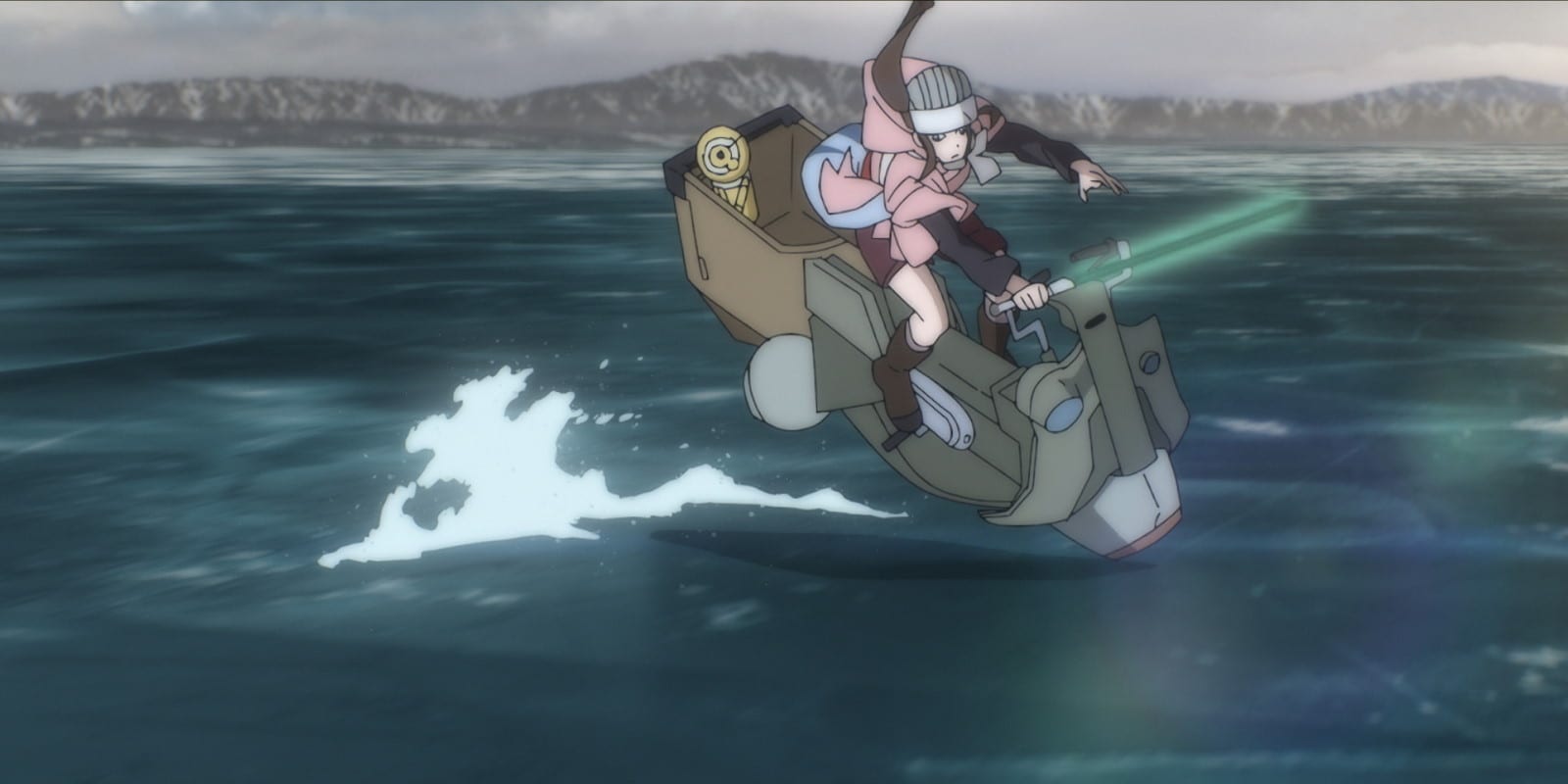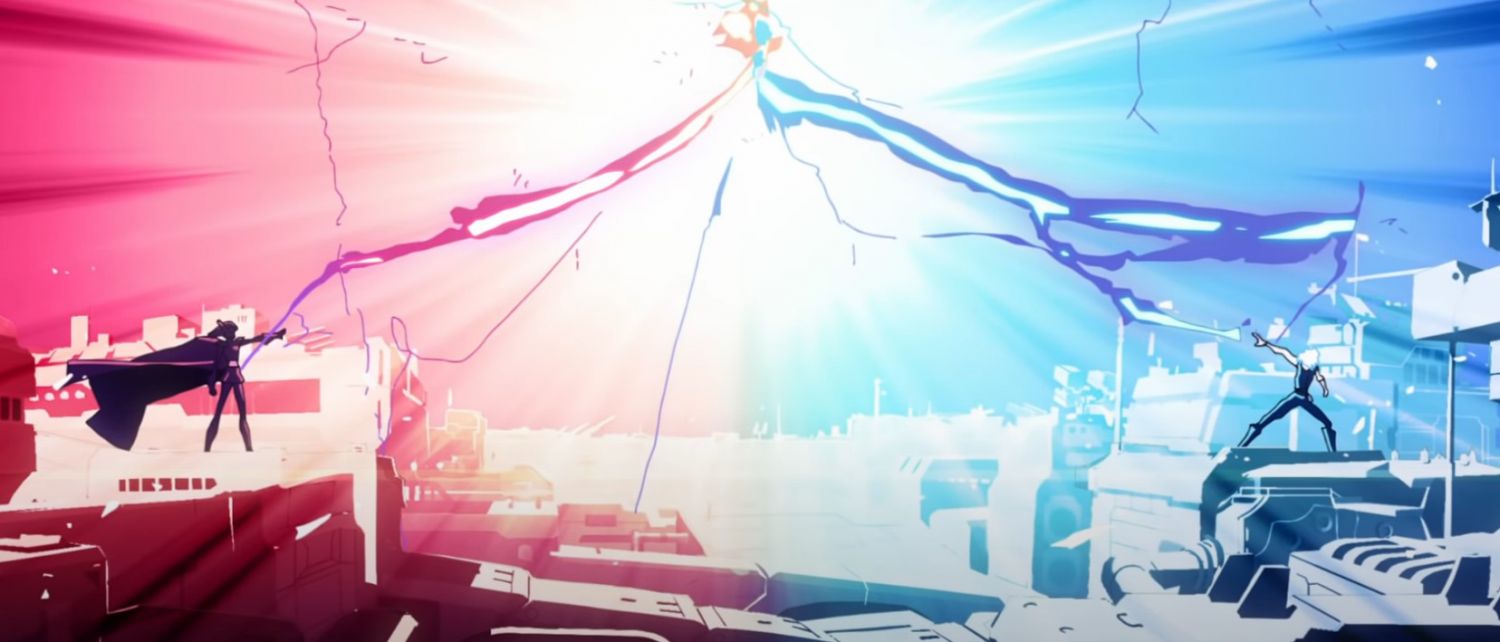
TV REVIEW: Star Wars: Visions S1
Although I’ve seen resistance to the idea of non-canon Star Wars stories and Star Wars done in Japanese anime style, I believe it’s an idea that George Lucas might have embraced. Even back during the days of the old Expanded Universe, there were projects including a Star Wars manga and Star Wars: Infinities, a comic focusing on alternate realities within the Star Wars mythos. Moreover, Star Wars has always embraced influences from Eastern filmmaking, including the works of Akira Kurosawa; A New Hope was inspired directly by Kurosawa’s The Hidden Fortress. The Jedi themselves are a very Eastern concept, drawing influences from the samurai and Bushido philosophy. The combination of Japanese animation and the Star Wars mythos comes together in a natural and fluid way, allowing Star Wars: Visions to breathe new life into a very old franchise. I find Visions to be an inspired idea, bringing fresh ideas from a different cultural perspective into the Star Wars galaxy.
Disney brought in seven different animation studios to produce short films for Visions. These studios include Trigger, Kamikaze Douga, Studio Colorido, Geno Studio, Kinema Citrus, Production I.G., and Science SARU. These choices have all proven quite solid in terms of the content and selection, each one producing a different angle to the Star Wars universe. Moreover, all of them seem to know and understand the basics of the universe, even when they present very different interpretations of the universe and its lore. Because these are non-canon stories, viewers are free to pick and choose the short films they like into their own idea of canon, while ignoring those that they don’t. Some of these short films could fit plausibly well into the official canon, while others are best seen as glimpses into alternate realities that might have existed. This format allows for creative experimentation with the material with no real risk that these films might damage anything that Star Wars fans might value.
The short films in this collection themselves are all quite enjoyable, generally ranging from above average to excellent in terms of quality. A couple of them are even top-tier Star Wars stories, worthy of the best moments in the entire saga. Some are good alternate takes on Star Wars and are enjoyable for what they are. Others are creatively interesting and perhaps stretch the boundaries a little too far, but they are acceptable so long as they remain non-canon stories and not part of the official mythos. If there’s any consistent issue I have with the season taken as a whole, it’s the tendency of certain episodes of falling into the narrative of “anyone can be a Jedi”. Still, given that these are short films, a certain amount of license can be forgiven here.

“The Duel” does a beautiful job of setting the tone for the series, establishing what the series is and what the viewer can expect. It’s also one of the most enjoyable episodes of the entire season, delivering an alternate-universe Star Wars story inspired by samurai anime and Kurosawa films. If you’re a fan of old-school anime like Ninja Scroll, you may appreciate the art design in this short. The action sometimes hits over-the-top silliness that would never work in live action, but in an anime, it comes across as “Rule of Cool” instead. The voice acting is quite good, featuring Lucy Liu in the role of the villain, a move of perfect casting given her Lady Snowblood inspired performance in Kill Bill Vol. 1. Brian Tee does a good job as the Ronin, the anti-hero of the piece, and the character reminds me pleasantly of Ninja Scroll’s Jubei, except with a Star Wars twist. This is easily one of the highlights of the entire season.
“Tatooine Rhapsody” is one of the odder selections, focusing on a musical band including a rogue Hutt and a former Jedi Padawan. Not only does the story focus more on the musical side of things, but the art style deliberately takes a chibi approach to Star Wars. While this is not bad for the lead characters in the short, it’s a little strange to see classic characters like Boba Fett depicted in chibi style. Still, the story is quite solid, and the voice cast is excellent. It’s nice to see Joseph Gordon-Levitt in a Star Wars role and Temuera Morrison is always a welcome presence as Boba Fett after his Mandalorian appearances. It’s not a personal favorite, but it’s quite watchable for what it is.
“The Twins” is a short film that’s worth seeing once, if only to experience how over the top and bizarre it is. On the one hand, the story embraces some of the key ideas of Star Wars, such as Force-sensitive twin siblings and grandiose ideas like superweapons. Putting the brother and sister in conflict works perfectly, given the family conflicts at the heart of the saga. However, these ideas are expressed in insane and even nonsensical ways, including a lightsaber battle in space and a hyperspace lightsaber move that is completely unworkable in live action. It’s an enjoyable episode just for how crazy the story gets, even if the narrative sense is completely lacking. Still, “The Twins” is fun to watch because of how mind-blowingly insane the story gets; it’s the kind of crazy that only anime can get away with. Also, Neil Patrick Harris is an actor I enjoy quite a bit, and he does a good job as the protagonist in this piece.

The series gets a bit more down-to-earth with “The Village Bride”, which deals with a reluctant Jedi’s decision to interfere with a dispute between an agrarian society and a band of raiders. This story feels like it could have taken place in the Order’s ancient past, thousands of years before the rise of the Empire. The English talents for this short includes some very strong voice talent, including Karen Fukuhara (of The Boys and Suicide Squad fame), Christopher Sean, and legendary actor Cary-Hiroyuki Tagawa (best known as Shang Tsung from Mortal Kombat). This one feels grounded in Japanese culture while also working well as a Star Wars story, and it’s worth watching.
My personal favorite short of this season was “The Ninth Jedi”, featuring the story of a sabersmith’s daughter who must deliver her father’s last lightsabers to a group of Jedi. Kara is excellent as the plucky young heroine of this short; she’s sympathetic, likable, and fun to watch in this story. The twist of the piece is brilliantly executed, and a good example of subverting expectations in a way that respects the canon. There are also some great voice actors here: Masi Oka (best known as Hiro Nakamura from Heroes), Simu Liu from Shang-Chi fame, and Kimiko Glenn all do some amazing work as these characters. This was an outstanding short, and one of the best Star Wars stories I’ve seen this year.
“T0-B1” is a more experimental piece, drawing on the style of classic anime series like Astro Boy in its character designs. T0-B1 is a likable enough lead character and he’s voiced well, but while interesting, the idea of a droid Jedi is one that I don’t think works too well in practice. Still, the character of Professor Mitaka is excellent, and the idea of a Jedi with a mission of terraforming worlds is quite inspired. Still, the handling of the droid characters is a bit silly at times, and this is one short that draws heavily on the “anyone can be a Jedi” narrative. Still, I can respect where this short is coming from with this story, even if it doesn’t hit all the right notes for me as a viewer.

From there, “The Elder” takes a more traditional Star Wars approach, focusing on a Jedi and his Padawan encountering a Sith on a planet in the Outer Rim. This story feels like a story that could take place in canon without missing a beat, and the Jedi/Padawan dynamic is engaging and enjoyable. The Elder is also a solid villain for this story, made all the better by the performance of veteran actor James Hong. There is not a bad performance in this, with David Harbour and Jordan Fisher rounding out the cast of this short. If you like classic Star Wars with a dash of samurai, this is a good one to watch.
“Lop and Ocho” is the heartbreaking story of two adopted sisters that belong to the Star Wars equivalent of a Yakuza clan. Interestingly enough, the filmmakers drew on existing lore to create the character of Lop, a member of a bunny-like species called the Lepi. The conflict is built on Japanese culture, but also hits the core themes of Star Wars with its emphasis on familial estrangement and nurture over nature. Lop was one of the characters in this season that I most connected to, and she’s an interesting choice to build a Star Wars story around. The acting in this piece is quite good from all involved, especially during the climax of the episode. “Lop and Ocho” has a tragic ending, but it’s one of the strongest stories in the season.
I’m not certain that “Akakiri” is the most appropriate episode to end the season on, but not because of the quality of the short. In fact, it’s quite a good episode, dealing with forbidden love and its resulting path to the dark side. The ending is quite powerful as well, and it is worth watching this episode, though I recommend not watching it last. The episode ends on a dark and downbeat note, and if you’re expecting the usual happy ending for a Star Wars tale, you won’t find it in this short. Still, it fits with the themes of the mythos despite this, hitting the themes and ideas of the prequel trilogy. I’ll also add that it’s good to see George Takei in a Star Wars story, and he does well in his role here.

All in all, Star Wars: Visions is the Star Wars show that I always wanted but didn’t know that I needed. This series brings in new ideas from talented creators and brings something different and imaginative to Star Wars, while at the same time being a perfect fit to the series. I very much hope that this season is not a one-off, as these studios are brimming with interesting ideas in these short episodes. Even the ones I enjoyed least have something new to contribute to the mythos, and that’s worth the price of admission. I sincerely hope there are more episodes of Visions to come, as this is one of the better initiatives I’ve seen out of Disney Star Wars in recent years.
Score: 4.5/5
Network: Disney+
Cast: Brian Tee, Lucy Liu, Joseph Gordon-Levitt, Bobby Moynihan, Temuera Morrison, Neil Patrick Harris, Alison Brie, Karen Fukuhara, Christopher Sean, Cary-Hiroyuki Tagawa, Neil Kaplan, Kimiko Glenn, Masi Oka, Simu Liu, Jaden Waldman, Kyle Chandler, David Harbour, James Hong, Anna Cathcart, Hiromi Dames, Kyle McCarley, Henry Golding, Jamie Chung, George Takei
Author Profile
- Steve Sellers had been a fan of superheroes ever since Superman: The Movie. But it took the JSA, the Legion of Super-Heroes, Dragonlance, Lord of the Rings, Twilight Zone, and Chris Claremont's legendary run on the X-Men to make him a writer and a longtime fan of comics, fantasy, and science fiction. Steve is the co-creator of WHITE DRUID & MICHAEL NERO and GUARDIANS OF ELAYIM for Omen Comics, and he is also the creator of BLITZ and SHOCKWAVE for Revelation Comics (an imprint of Omen Comics).










